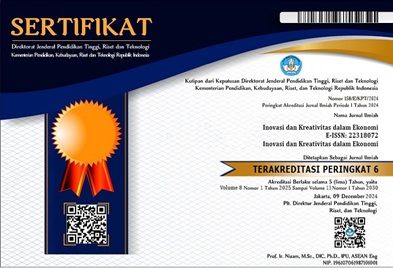KEBIJAKAN ZERO WASTE MENGGUNAKAN MBT UNTUK MENCAPAI PENGELOLAAN SAMPAH BERKELANJUTAN: DESAIN DAN PENDEKATAN KOLABORATIF
Kata Kunci:
Zero Waste, MBT System, Desain Kebijakan, Pengelolaan Limbah, Pendekatan KolaboratifAbstrak
Meningkatnya volume sampah di Indonesia menjadi tantangan serius bagi lingkungan dan kesehatan. Kebijakan Zero Waste berbasis Mechanical Biolog ical Treatment (MBT) diusulkan sebagai solusi untuk mencapai pengelolaan sampah berkelanjutan. Teknologi ini memadukan proses mekanis dan biologis untuk mengurangi jumlah limbah sampah. Penelitian ini bertujuan untuk menganalisis desain kebijakan Zero Waste berbasis MBT dan mengeksplorasi pendekatan kolaboratif dalam implementasinya. Metode yang digunakan dalam penelitian ini adalah metode studi literatur dengan mengambil sumber dari literatur-literatur penelitian terdahulu terkait kebijakan Zero Waste, teknologi MBT, dan penerapannya. Hasil penelitian menunjukan bahwa desain kebijakan Zero Waste berbasis MBT memerlukan sinergi antara pemerintah, sektor swasta, dan masyarakat. Pendekatan kolaboratif sangat penting untuk memastikan implementasi yang efektif, terutama melalui pembentukan kerangka regulasi yang mendukung, peningkatan kapasitas teknologi, serta partisipasi aktif dari masyarakat dalam pengelolaan limbah. Namun, tentu terdapat tantangan dalam penerapan MBT di Indonesia seperti keterbatasan infrastruktur, biaya operasional yang tinggi, serta rendahnya kesadaran publik. Solusi yang ditawarkan meliputi penguatan kemitraan publik dan swasta, pengembangan teknologi lokal, dan meningkatkan edukasi masyarakat tentang pentingnya pengelolaan limbah berkelanjutan. Kebijakan Zero Waste berbasis MBT dapat diimplementasikan dengan efektif melalui desain kebijakan yang inkusif dan pendekatan kolaboratif yang tepat.
The increasing volume of waste in Indonesia is a serious challenge for the environment and health. The Zero Waste policy based on Mechanical Biological Treatment (MBT) is proposed as a solution to achieve sustainable waste management. This technology blends mechanical and biological processes to reduce the amount of waste. This study aims to analyze the design of MBT-based Zero Waste policies and explore collaborative approaches in their implementation. The method used in this study is a literature study method by taking sources from previous research literature related to the Zero Waste policy, MBT technology, and its application. The results of the study show that the design of the MBT-based Zero Waste policy requires synergy between the government, the private sector, and the community. A collaborative approach is essential to ensure effective implementation, especially through the establishment of a supportive regulatory framework, technological capacity building, and active participation of communities in waste management. However, of course, there are challenges in the implementation of MBT in Indonesia, such as limited infrastructure, high operational costs, and low public awareness. The solutions offered include strengthening public-private partnerships, developing local technology, and increasing public education on the importance of sustainable waste management. MBT-based Zero Waste policies can be implemented effectively through inductive policy design and appropriate collaborative approaches.





